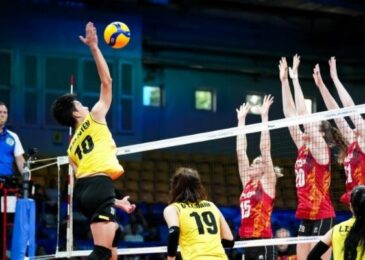By [Your Name] (SEO Expert/Professional Copywriter)
Coaching in any sport is often rooted in tradition. These time-honored practices have been passed down from generation to generation, shaping the way we approach training and development. However, in the world of volleyball, sticking to tradition may not always yield the desired results.
Bạn đang xem: Traditions
As a coach, it is essential to constantly evaluate our methods and be open to change when necessary. The key lies in understanding what works, why it works, and being able to provide data-driven evidence to support our coaching techniques. By embracing new ideas and sharing knowledge with other coaches, we can elevate the level of play across the volleyball community.
The Impact of Tradition
Xem thêm : U.S. Women to Compete for Bronze Medal at Pan American Cup
Tradition in volleyball encompasses every aspect of the game, from team tryouts to conditioning, skill training, and offensive systems. Coaches who adhere strictly to tradition often view themselves as the sole source of knowledge, while players are seen as empty vessels waiting to be filled. However, this outdated approach fails to serve the best interests of our players.
When we continue to use techniques that do not lead to continuous improvement, we hinder our players’ progress. It is essential for us, as coaches, to reassess our methods and embrace what truly works. To do this effectively, the power of assessments and shared data becomes crucial. By utilizing assessments and gathering data, we can identify what is working and make informed decisions based on evidence.
Embracing Change
Recently, I attended a clinic/tryout for a Junior National Team and was struck by the stark differences in coaching philosophies and techniques. Despite the shared goal of developing players, each coach had their own unique approach to the game. From the number of steps in an approach to serving techniques, blocking strategies, and even passing skills, every coach seemed to have a different perspective.
This diversity of techniques left the players feeling confused and questioning which approach was the correct one. As a coach, I empathized with their frustration. It made me reflect on my own coaching abilities and wonder if I was doing justice to my players.
Finding the Right Path
Xem thêm : Adidas and USA Volleyball Announce Exciting Multi-Year Partnership
When faced with such a wide variety of coaching methods, it can be challenging to determine the best path forward. I realized that there is no one-size-fits-all answer. As coaches, our role is to guide our players, encourage them to give their best effort, and allow them to judge for themselves which techniques work best for them. It’s a process of trial and error, and it requires patience and open-mindedness.
As coaches, we must also break away from the tradition of withholding data and knowledge. By sharing our data and collaborating with other coaches, we can collectively raise the level of play in volleyball. It’s crucial to focus on continuous improvement and create a supportive network where coaches can learn from one another.
FAQs
Q: How can I determine which coaching techniques are the most effective?
A: Evaluating coaching techniques requires a combination of experience, data analysis, and collaboration with other coaches. By utilizing assessments and sharing data, we can gain insights into what works and make informed decisions.
Q: How can coaches collaborate to improve the level of play in volleyball?
A: Collaboration is key. By sharing data and knowledge with other coaches, we can collectively raise the bar in volleyball. This collaboration can take the form of attending coaching clinics, joining coaching associations, or simply engaging in open conversations with fellow coaches.
Q: What if there are conflicting coaching techniques?
A: Conflicting coaching techniques are common in the world of volleyball. It’s important for coaches to encourage their players to give their best effort and determine what works best for them personally. It’s a process of trial and error, and coaches must be open to adapting their methods based on individual player needs.
Summary
In the world of volleyball, tradition has played a significant role in shaping coaching practices. However, it is essential for coaches to be open to change and constantly evaluate their methods. By embracing new ideas, sharing data, and collaborating with other coaches, we can create a supportive community that fosters continuous improvement. Let us break away from tradition and strive for excellence in coaching, because what worked in the past may not necessarily be the best approach for the future.
For more information on coaching techniques and to stay up-to-date with the latest trends in volleyball, visit Alpinetgheep.com.
Nguồn: https://alpinetgheep.com
Danh mục: Volleyball


